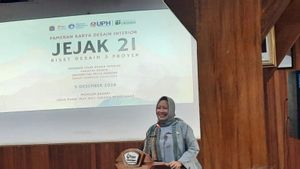JAKARTA - When people advise you to "have a good attitude" in relationships, it usually means emphasizing the importance of kindness, empathy, and compromise in building harmony.
Although these things are good, there needs to be a balance between being good and being too accommodative. When you focus too much on being fun, it means that you let others take advantage of good. So that this can create unhealthy dynamics where boundaries run away and hatred slowly forms.
Therefore, it is very important to differentiate between being kind and maintaining. Although the two may seem similar, being kind often involves self-sacred and avoiding difficult conversations, while maintaining a attitude encourages mutual concern and honesty. When goodness sacrifices your own well-being, it erodes the foundation of the relationship, so there is no room for your relationship to develop.
Here are three hidden dangers of being too good in a relationship that supports Psychology Today, Wednesday, October 30.
Self-trial in a relationship often feels noble, as if prioritizing your partner's needs above your needs is an expression of pure love. You may find yourself constantly agreeing to his plans that are against you.
Initially, these sacrifices may seem good, but remember relationships require compromise. When self-sacred becomes a habit, it causes emotional exhaustion. Ignoring your own needs constantly not only erodes identity and self-esteem, but also creates frustration and fatigue. Makes you feel invisible and not listened to.
A 2012 study revealed that emotional stress that often accompanies sacrifices led to increased feelings of negativity and decreased relationship satisfaction. Over time, this emphasis has even increased the desire to end the relationship.
In an effort to avoid conflict or discomfort, you may find yourself suppressing true feelings or opinions, choosing peace rather than authenticity. Whether it pretends to have an interest you don't care about or remains silent during the dispute, this facility only creates a shallow sense of harmony.
While self-restraining may seem like an easy way to avoid uncomfortable moments, it comes with significant emotional costs. Research shows that people often adapt to what they believe is expected from them. Acting according to these imagined needs and pretending to be someone you are not to be to your partner can slowly erode your sense of self. This creates a layer of approval and satisfaction in less deep relationships and sincere connections.
Over time, emotional distance is formed because your partner is not aware of your true thoughts and feelings, making you feel misunderstood or even invisible. The lack of authentic expressions not only hinders intimacy but also fosters a sense of sensing.
To build a real connection, it is very important to balance kindness with honesty. By being vulnerable and open about feelings, you create a deeper and more meaningful space for relationships that are rooted in authenticity than regularity.
Implementing disrespectful or painful behavior in the name of being "good" can feel like an act of patience, but often backfires. You may forgive your partner's behavior, hoping that by not reacting, you will avoid conflict or kindness you will inspire change. However, by ignoring or underestimating negative behavior, you basically signal that your partner's actions have no consequences, which allow unhealthy patterns to survive and deteriorate.
Whether it's passive-aggressive comments, disrespectful behavior, or late habits, tolerating bad behavior often leads to stagnation instead of change. Over time, this dynamic erodes your self-esteem and creates a power imbalance, where your needs and limitations are constantly being ignored.
SEE ALSO:
Be careful that if you seek open communication while your partner avoids discussing conflict, it can lead to excessive contemplation and thinking, which ultimately increases dissatisfaction in relationships as shown in research.
In contrast, a 2018 study published in the Journal of Social and Personal Relations shows that direct conflict, rather than passive tolerance, is more effective at tackling serious issues and driving real change.
The English, Chinese, Japanese, Arabic, and French versions are automatically generated by the AI. So there may still be inaccuracies in translating, please always see Indonesian as our main language. (system supported by DigitalSiber.id)


















